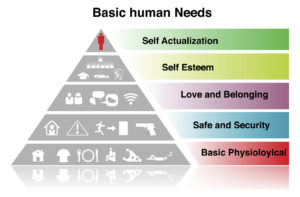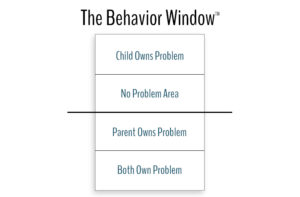A theory about the nature of human needs was developed by the famous psychologist, Abraham Maslow. He researched very productive people, like Eleanor Roosevelt, Lincoln, Ruth Benedict, Albert Schweitzer and others. He found that these individuals had many common characteristics. Among these were a zest for life, creative energy, a sense of humor, and higher and more frequent “peak” experiences. He called the possession of these characteristics Self-Actualization, the full and complete use of one’s potential.
Maslow essentially discovered that all people have five levels of needs. Self-Actualized people are those who are able to get enough of their Level I – IV needs met so they can move up and accomplish things in Level V. It does not mean that they have to meet all of their lower level needs before they can function in Level V. Maslow found that people are limited in their personal growth and development when deprived of needs-satisfaction at any level.
This is a good model for helping to provide a definition of what a need is since in everyday language, what are called “needs” are often really solutions. The main point of using the hierarchy is to recognize that a certain amount of the “lower level” needs have to be at least partly satisfied before a person can address “higher level” needs. Maslow selected a relatively small study group, because his intention was to get others thinking about what he initiated regarding human needs.
His material provides a good definition of the word “need” that is critical for understanding and executing Step I – Define Needs in the Method III process. In addition to the traits mentioned in his writings, he also included such qualities as: an acceptance of self and others, resistance to social pressures and a view of life’s difficulties as problems requiring solutions instead of person trials.
He noted that the people he identified enjoyed solitude, autonomy and relationships with a few close friends and family members and that a number of them also suffered from imperfections such as anxiety, guilt, and absentmindedness.
How well people have their lower level needs met depends on their income level and living conditions. Even for people who have most of their Level I Needs met, growing concerns about terrorism, natural disasters, unemployment and teen violence have a significant impact on how many people feel about their Level II, security needs. Many suburban parents and teens who previously paid minimal attention to security concerns now experience fears about high school shootings, bomb threats and an overall rise in violence.
P.E.T. groups vary according to the background and circumstances of the participants. Young, single, unemployed mothers living in an unsafe urban neighborhood, will most likely be struggling to meet Level I and II needs while suburban parents in high income jobs will have most of those needs met and will be primarily focused on Levels III and IV. In a number of other countries, large segments of the population struggle daily to meet even their basic Level I needs. On the other hand, Maslow theory does not mean that people have to be rich and famous or meet all their lower level needs in order to work on Self Actualization.
One way to link Maslow’s Hierarchy of Needs with the P.E.T. Behavior Window is to think that in general, there is a connection between Maslow’s Level IV and the No Problem Area. When people have a satisfactory amount of their physical, safety and social needs met, they are able to function in the No Problem Area.
This is not to say that all their lower level needs are met. It does mean that enough of those needs are met for them to function in the No Problem area in school, work and life with the people around them. It also affects how well parents can participate in a P.E.T. course; they need to have enough of their needs met in Levels I and II in order to be in the No Problem Area during each session. Think of a complaining or ill-tempered child. His behavior does not mean the child is “bad”. Rather, it is a clue that the “Child Owns a Problem”.
By using Active Listening, the parent can help the child to identify the problem (i.e. hungry, a Maslow Level I need), find his own solution, (make a snack) and then once again be in the “No Problem Area” – Level IV of Maslow with his parent. An individual does not “reach” a certain level of Maslow and remain there. Internal and external events can strongly affect his or her needs. A child doing well in her social development and school work (Levels III and IV) who experiences a sudden move with her family from a suburb to city (to a new neighborhood and school) may begin to show signs of insecurity and social alienation (Levels II & III) while her grades go down (Level IV).
Obviously, the philosophy and tools of P.E.T. have a large impact at Level III – increasing people’s social and interactive skills to create stronger and more rewarding relationships. However, the skills of Active Listening, I-Messages and Method III can also provide significant help and support to people working to meet their Level II – Security and Level IV – Achievement and Self-Esteem needs.
For example, Teacher and Leader Effectiveness Training courses, in addition to focusing on social skills, also help participants deal with achievement, effectiveness and success on the job – Level IV. Active Listening by a parent may not help her child solve all his concerns about bullying at school or a lack of friends, but it may be enough so the child can continue to do his schoolwork in spite of not having all his Security or Social needs met.

